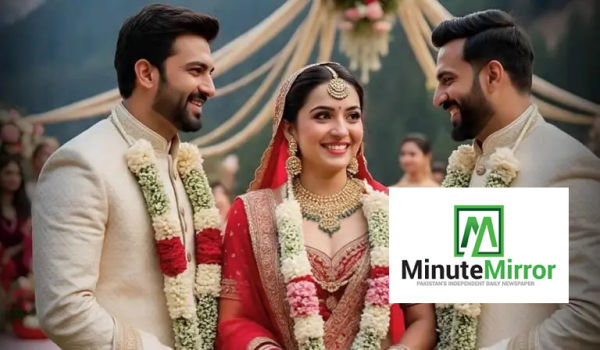
In a rare and culturally significant event, two brothers from India’s Hatti tribe in Himachal Pradesh have married the same woman, reviving the ancient tradition of polyandry that is now rarely practiced.
The wedding took place in Shillai village, nestled in the Trans-Giri region of Sirmaur district. The three-day celebration, which began on July 12, drew hundreds of villagers and family members who came to witness the unique ceremony. The bride, Sunita Chauhan from Kunhat village, married brothers Pradeep Negi and Kapil Negi in a vibrant event marked by traditional music, folk dances, and sacred rituals.
Videos of the ceremony have since gone viral on social media, drawing widespread attention and sparking curiosity about the tradition. Both brothers and their bride point up that the decision was made with mutual consent and without any external pressure.
“I knew about this tradition and agreed to it willingly,” Sunita said, expressing her respect for the cultural bond they have embraced. Pradeep, who works as a government employee, said he felt proud to openly carry forward the practice. Kapil, who works away from home, noted that their shared marriage brings emotional and familial stability.
The practice of polyandry—locally known as Jodidara—is still legally recognized under Himachal Pradesh’s revenue laws. While such unions have become uncommon, they remain socially accepted in some tribal communities. According to local reports, five similar marriages have taken place in the nearby village of Badhana over the last six years.
Community elders say the custom originated to prevent the division of ancestral land and to maintain strong family units among siblings, even half-brothers. Kundan Singh Shastri, General Secretary of the Kendriya Hatti Samiti, said the tradition once played a vital role in preserving property, reducing family disputes, and ensuring larger, more secure households.
Despite these practical benefits, critics argue that polyandrous marriages raise concerns over women’s property rights, which remain an unresolved issue. In the past, such weddings were celebrated openly, but today they are often conducted more discreetly—even in areas where the custom is still respected.
As traditional chants echoed through the hills of Shillai, the marriage of Sunita Chauhan to both brothers stood as a living example of a centuries-old custom that still endures, even as modern life increasingly shapes the cultural landscape of rural India.
We welcome your contributions! Submit your blogs, opinion pieces, press releases, news story pitches, and news features to opinion@minutemirror.com.pk and minutemirrormail@gmail.com